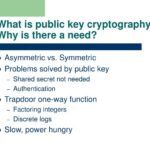When delving into the labyrinthine world of cryptography, one may pose the question: is cryptography merely an elaborate facade of mathematics, or does it encompass something far more profound? On the surface, cryptography appears to be a sophisticated application of mathematical principles designed for the secure transmission of information. Yet, as one probes deeper, a rich tapestry of concepts, theories, and practical considerations emerges, revealing that the essence of cryptography transcends mere mathematics.
At its core, cryptography is the science dedicated to securing digital communication through various encoding techniques. This technical aspect undeniably requires a solid grounding in mathematics. Techniques such as hashing, encryption algorithms, and key generation rely on number theory, combinatorics, and abstract algebra. For example, the RSA algorithm operates on the principles of prime factorization. The security of this method hinges upon the computational challenge posed by deriving large prime numbers—a task that becomes increasingly complex as the number of digits increases.
However, to reduce cryptography solely to its mathematical components is to overlook its multifaceted nature. Beyond numeric calculations and algorithms, cryptography serves as a tool for safeguarding individual privacy, maintaining the integrity of data, and ensuring authenticity in communication. This dimension introduces a plethora of ethical considerations regarding the use and potential misuse of cryptographic techniques.
But what about the social implications? In a world marked by escalating cyber-attacks and a pervasive surveillance culture, the importance of cryptography becomes ever more pronounced. Citizens, corporations, and governments rely on encryption to protect sensitive information from prying eyes. Yet, the ongoing debate regarding governmental access to encrypted data highlights the intricate balance between privacy rights and national security. Cryptography thus becomes a battleground for conflicting interests, raising essential questions: should there be limits on encryption? Is privacy an absolute right?
Moreover, the dynamic landscape of technology necessitates that cryptography evolves in tandem with emerging threats. As quantum computing looms on the horizon, traditional encryption methods risk obsolescence. Quantum computers have the potential to solve mathematical problems at speeds unattainable by classical computers, rendering widely-used encryption protocols, such as RSA, vulnerable. This impending shift underscores the necessity for adaptive cryptographic frameworks, prompting researchers to explore quantum-resistant algorithms.
In considering these challenges, one must not disregard the educational aspect intrinsic to cryptography. Its study entails far more than arithmetic computations. It requires an understanding of computer science, security principles, and even philosophical quandaries surrounding trust and authority. The interplay of these disciplines fosters a comprehensive perspective, enabling future cryptographers to better navigate the complexities of the field.
Engaging with cryptography also leads to an exploration of its historical significance. From ancient Caesar ciphers to modern public key infrastructures, the evolution of cryptographic methods reflects societal shifts and technological advancements. This historical lens offers a narrative that enhances our understanding of current practices. Furthermore, it exemplifies the ongoing quest for improving security measures, indicating that cryptography is as much a reflection of human ingenuity and creativity as it is a mathematical endeavor.
In pursuit of further exploration, one must acknowledge the role of cryptographic protocols in fostering trust. Trust is a critical element of any transaction, whether it be monetary, social, or communicational. Digital signatures, integral to protocols like TLS/SSL, ensure that parties engaging in online exchanges can verify one another’s identities, thereby laying the groundwork for secure interactions. This dimension signifies that cryptography facilitates not only security but also connectivity, contributing to the fabric of digital collaboration in an increasingly interconnected world.
Yet, this reliance on cryptography does not come without complications. The potential for misuse is a double-edged sword. While encryption empowers individuals to shield their private conversations, it can also provide a cover for illicit activities. The very tools designed to uphold dignity and rights can simultaneously enable criminal undertakings. This paradox raises the question: can we trust cryptography to always serve as a protector, rather than a facilitator of wrongdoing?
A deeper inquiry into the subject leads to pondering the future trajectory of cryptography. With the exponential growth of data and the relentless evolution of cyber threats, one must contemplate the next iteration of this mathematical art. Will artificial intelligence technologies come to the forefront, altering the paradigms of encryption and decryption? As algorithms become increasingly sophisticated, navigating the balance between innovation and ethical boundaries will be paramount.
Ultimately, to encapsulate cryptography as mere math is to disregard the rich, intricate world it inhabits. It is an art deeply interwoven with societal implications, ethical dilemmas, and technological innovations. While mathematical foundations remain essential, the true essence of cryptography lies in its ability to adapt, evolve, and serve as a protector of the complex digital lives we lead. Cryptography poses an almost alchemical challenge: transforming mathematical theories into an indispensable shield for communication in an ever-changing landscape. As one navigates this digital realm, the question remains—will cryptography continue to flourish as a mathematical craft, or will it transcend its numerical roots to emerge as a broader societal construct?








Leave a Comment